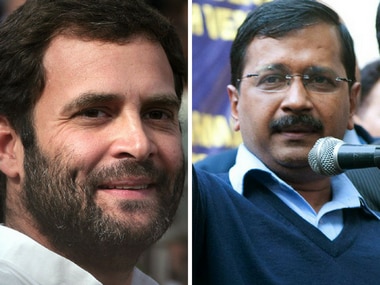Congress' refusal to support AAP in tussle with L-G effectively makes it BJP's B-team in Delhi
Where exactly does the Congress stand in Delhi? Is it the so-called fulcrum of the incipient anti-BJP alliance that’s going to take on Narendra Modi in the next election? Or, is it the B-team of the BJP, an opportunistic party plying its politics on the old principle of an enemy’s enemy being a friend?
On current and past evidence, the Congress is just His Master’s Voice for the BJP. Its politics is a perfect example of the famous Mukesh song: Jo tumko ho pasand wahin baat kahenge (will say only what you like). Even if it means calling night as day, or making several ideological compromises to become the chorus of the BJP’s theme song.
The current stance of the Congress on the ongoing tussle between the AAP government and the Centre underlines its philosophy of supporting the BJP when it suits its objectives—either by echoing its voice or through silence—even if it means jettisoning the Opposition for its own political gains.
For the past few days, the Delhi chief minister and his colleagues have been sitting on a dharna at the Lt Governor’s residence. Arvind Kejriwal is demanding that the L-G intervene to end the 'strike' by IAS officers assigned to the Delhi government. His government has handed over a letter of demands to the L-G, in which they requested him to issue orders that all IAS officers who do not return to work would have proceedings initiated against them and, if necessary, ESMA would be invoked against them. They also wanted the L-G to act against the officers “who have stalled work till now”.
The Congress is trying to forge an alliance with regional parties by calling the BJP a “threat to democratic institutions.” It has given a call for unity claiming the BJP has no respect for democratically elected rivals and is out to destroy the country’s federal structure. If the Congress really believed its rhetoric, Delhi would have been an ideal case for standing up for the AAP, democracy and federalism. But, the Congress—adept at opportunism, U-turns and compromises that suit its politics—has preferred to either castigate the Delhi chief minister or remain silent.
Kejriwal is the leader of the democratically elected government of Delhi. His party enjoys one of the biggest majorities in the history of Indian democracy. Whatever be the merits of his demands or the veracity of his arguments, the L-G’s decision to not meet him or his colleagues to break the deadlock is a plain rebuke to the Delhi government, and by extension to his voters. But, the Congress, which has been vocal about the interference of governors in other states, has been quiet about the stand-off in Delhi.
Its reaction has been limited to calling Kejriwal’s dharna a “drama” to distract from the water crisis in Delhi. However, it has not said a word about the validity of Kejriwal’s demands, the allegations of strike and non-cooperation by bureaucrats. Its leaders have not said a single word about the legality of the decision of the IAS officers to not attend meetings of the Delhi government, thus bringing it to a standstill. In short, it has not taken an ideological stand based on the merits of the case, thus supporting a status quo that helps the BJP.
The Congress has been vocal against Kejriwal and equivocal on his demands in spite of the fact that many of its potential allies like the TMC, CPM and RLD have supported the Delhi government. Even Mamata Banerjee and her arch-rival Sitaram Yechury has endorsed Kejriwal’s stand, indicating that on certain issues, even these two parties are willing to speak in unison.
This opportunism is exactly what makes the Congress argument that the Opposition must unite for the sake of democracy, Indian Constitution and institutions a lie. It shows the only ideology the Congress believes in self-preservation. So, it will cosy up to rivals who can keep it alive politically by striking unholy and opportunistic alliances, like the one in Karnataka. But, when it sees a threat to itself from a regional party that’s part of the anti-Modi lineup, it will not think twice before becoming the BJP’s puppet.
It is, of course, easy to understand Congress’ Kejriwal-phobia. It sees the AAP as a clear threat in Delhi. A year ago, it was so spooked by the AAP’s rise in Punjab that there were rumours of a tacit alliance between the Akalis and the Congress to keep the AAP out. In Kejriwal, the Congress also sees a leader, who though down and out, can resurrect himself and attain his post-2014 stature of a BJP-slayer. So, the AAP’s demise and Kejriwal’s downfall is a necessary pre-condition for the survival of the Congress.
But, if other regional parties are watching closely, they should notice two things about the Congress. One, it will swing from one ideological position to another, depending on what serves its interests more. Two, it will try its best to destroy a regional party that could become a future challenge, even if it implies singing the BJP’s tune.



No comments:
Post a Comment